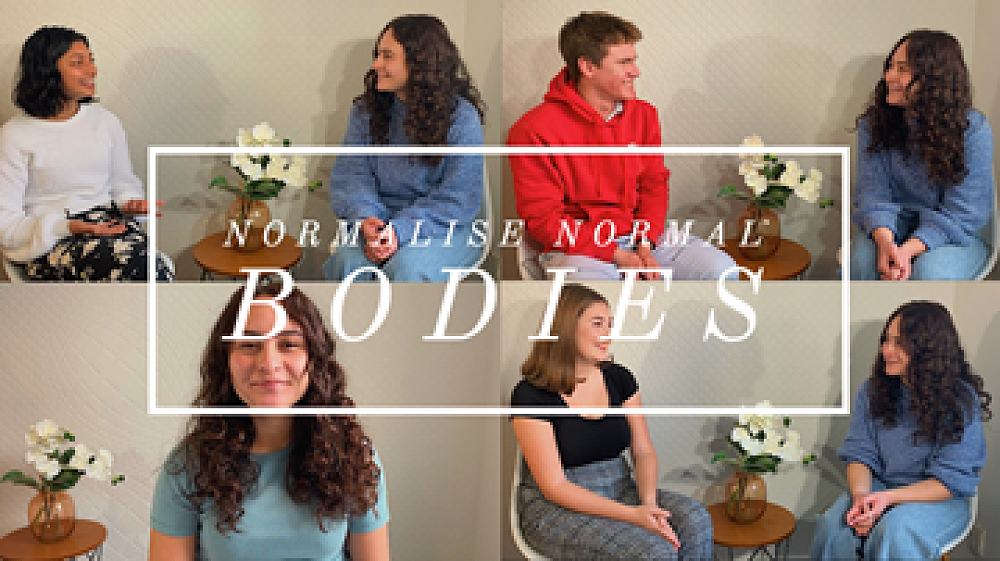
Normalise Normal Bodies
For most of my life, I had bought into the idea that if I was slimmer, whiter, taller or scarless that I would finally be pretty and therefore my life would be better. The fashion industry and the media reinforce the idealisation of thinness and the concept of a ‘perfect’ body. This causes a toxic culture that permeated so much of my daily life that it was hard to escape.
For instance, every time I opened a magazine, turned on the television, scrolled through social media or looked at the doll display in a store, I was reminded that my natural body was undesirable and supposedly not good enough. As a way of fighting back, this year I wanted to generate a conversation about body empowerment to learn how people have overcome shame and body image stigma. This is because I believe that if young people can speak out about their body image, then we are making progress.
Many people are unaware body image is a critical health issue. Yet a third of young women, and over one in ten young men, are unhappy with their physical appearance and have been teased by friends and family about their bodies, according to the Youth 2012 Health & Wellbeing of New Zealand Secondary School Students Survey.
Celebrities and influencers fuel this issue and are complicit in the distress and trauma of young people by perpetuating the narrative that looks are what matters most, by not calling out the use of photoshop and by having surgeries without admitting it.
This absence of transparency and glorification of celebrities with a ‘perfect’ body type has had a negative effect on Year 12 student Jaxon Marshall.
‘TV shows like Riverdale and Outerbanks reinforce the idea of men being tall and muscular with flawless skin, which makes me feel like I’m never quite good enough. From a young age, boys are taught that it’s not very manly to talk about how we feel in our bodies, caring about what you look like is perceived as only acceptable for women,’ he said.
Jaxon is a keen sportsman known for his athletic body type, but despite meeting conventional beauty standards, the pressure to look like the worshipped celebrities we see on TV has meant he has faced challenges with his body image.
Another Year 12 student; fashionista Tyler Russ, grew up believing ‘skinny was synonymous with beautiful.’ This harmful perception led to her constantly comparing her body to others. It was only when Tyler began seeing a representation of her body type in the media that she began to value her body and realise that it does not make someone undesirable because their physical appearance is outside of the norm.
Representation was also crucial in helping Year 13 student Maya Jayasena overcome the detrimental impacts that colourism has had on her childhood.
‘As a non-white person growing up in a majority-white New Zealand society, I felt a pressure to hide who I was’ she said. Maya acknowledges Disney princesses like Tiana and Jasmine and the key role they played in making a young Maya feel seen. ‘Representation has really helped... seeing yourself in someone who looks like you in a position where they are happy and successful’ she said.
Maya, Tyler and Jaxon all feel empowered in their bodies today for contrasting reasons.
Maya explained it was her realisation that being pretty should not be a priority. ‘I’ve got a lot of things that make me worthwhile and being pretty does not have to be one of them’ she said.
Jaxon is grateful for the opportunities his body provides him. ‘My body allows me to go tramping, skiing and swimming and these experiences make me feel happy and grateful for the body that I have’ he said.
Tyler believes in the importance of diversity being celebrated rather than criticised. ‘All people are beautiful because they look different’ she said.
Generating conversation about body image has reinforced how common body image issues are amongst youth and the need for people to speak out against toxicity. Our culture praises youths, particularly young women, for their appearance before celebrating their kindness or intellect. Therefore, the more we can openly talk about how our current society capitalises on making young people believe we need to be ‘fixed,’ the faster we can undo this toxic narrative to create a more inclusive world.

